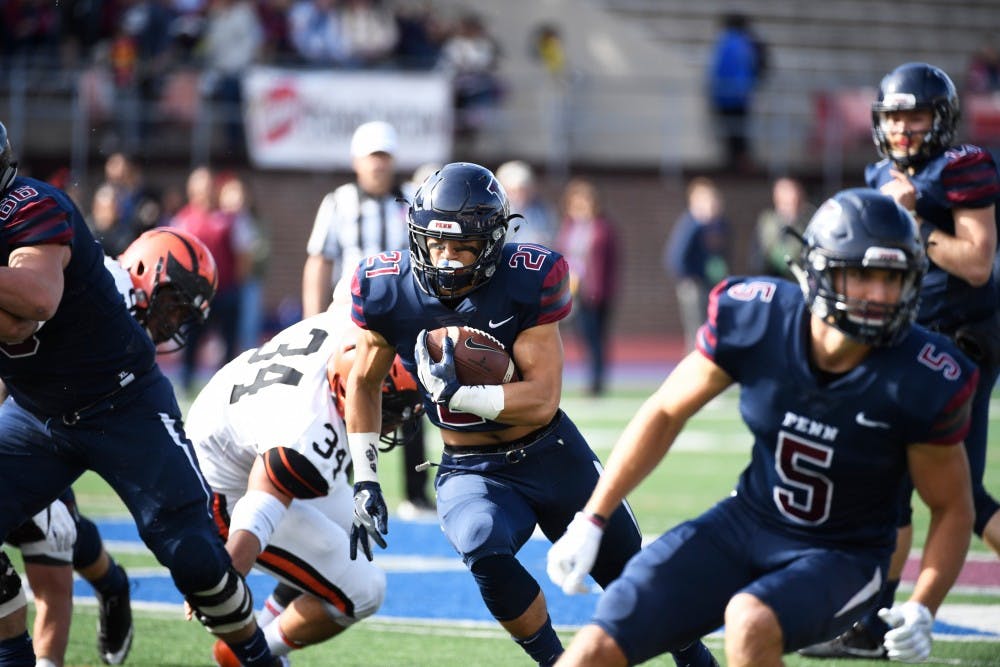
Sophomore running back Abe Willows could be key if Penn football wants to its next two games to stay alive in the Ivy League championship race.
Credit: Chase SuttonDon't count the Quakers out of it just yet.
After Saturday’s wild 38-35 Homecoming win over rival Princeton, combined with other results from the ever-tumultuous Ivy League, Penn football has launched itself back into the mix for the conference title.
As it stands after this week’s games, the Red and Blue sit tied with Princeton at 6th in the league standings with a conference record of 2-3. Yale is alone at the top with a 4-1 Ivy record and astoundingly, four teams are tied with a record of 3-2.
This logjam means that, in the final two weeks of the season, all of the top seven teams have some chance to earn a share of the Ivy title if results go their respective ways.
You read that correctly. Somehow, it’s still entirely possible that these top seven could all finish at 4-3, which would lead to a mind-blowing seven-way tie for the conference title.
Some might say that this isn’t at all what sports should be about. There should be one winner and a bunch of losers, right? Wrong.
In my opinion, this is actually a great thing for the league. It means seven of the eight teams are still alive and fighting, which, in itself, is incredible. Usually, at this point in the season, more than half of the conference is out of title contention, which realistically results in lower quality, less-spirited play.
But now, in this conference, every game matters. Literally every game.
For the Quakers, this mentality is nothing new. They have already been playing with this do-or-die mindset ever since their 0-3 start in the Ivy League. Since then, they have picked up two straight conference wins and have completely changed the momentum of their season.
As strong as Penn has been the last two weeks, the team still needs other games to play out in its favor. For starters, the Quakers need to win their remaining two games against Harvard and Cornell, who are both 3-2 in the Ancient Eight. That would put the Red and Blue at 4-3, and at this point that’s the best they can hope for, and it might just be enough.
“It feels great. We talked about [the Ivy title] but it’s one week at a time. It’s about playing the best we can, but it’s definitely cool that we’re not out of it,” senior captain Justin Watson said.
Princeton would also have to win out as the other 2-3 team for this massive tie to occur. The Tigers play league-leader Yale and 3-2 Dartmouth, and if they finish at 4-3 as well, they will have done a lot of the hard work needed for the Quakers and 5 others to share the title.
Yale, at 4-1, would have to lose its next two games to Princeton and Harvard for Penn’s hopes to remain intact.
The only predictable games involve Brown, stuck at the bottom of the league standings and still looking for its first Ivy win. Nobody expects the Bears to score upsets over Dartmouth or Columbia, and as a result, both of those teams will have to lose in their other games, against Princeton and Cornell respectively, for the seven-way tie to hold.
Moving away from all the permutations, this whole scenario, while complex, intense, and improbable, is great for the Ivy League as a whole. To have this many competitive teams racing down to the wire for the league title is as much as any football fan could ask for.
Over and over, I've heard pundits lambast the "participation trophy" trend in sports. "Championships are supposed to be earned," they say.
"Not everyone deserves a trophy," they say.
I'm here to tell you that "they" are wrong in this case. This Ivy League season has had last-minute comebacks, goal-line stops, dramatic upsets, and overall, no shortage of excitement.
All of these players and teams have been laying it all on the line all season long. The seven-way tie scenario wouldn't be the result of the lack of competition that people say the "participation trophy generation" breeds, but rather, it'd be the result of a surplus of dramatic competition.
As the league nears the end of its tightest season in decades, we wonder if the impossible can be made possible. Having seven co-champions is unlikely, but as we’ve seen in the Ivy League this season, anything is possible.
The Daily Pennsylvanian is an independent, student-run newspaper. Please consider making a donation to support the coverage that shapes the University. Your generosity ensures a future of strong journalism at Penn.
Donate



